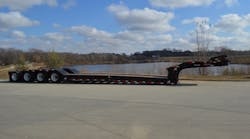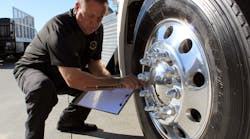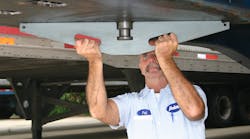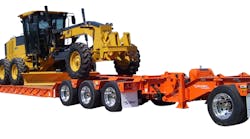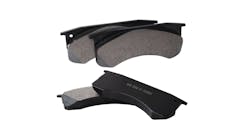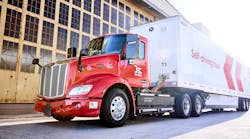Inspection is a key process in prolonging the life of heavy haul and specialized trailers. According to Josh Doyle, customer service manager at XL Specialized Trailers, not only should these trailers undergo a required annual inspection, but also proper tire pressure and lubrication should be reviewed prior to every use.
He also recommends a thorough walkaround inspection on a monthly basis.
XL Specialized Trailers (www.xlspecializedtrailer.com) is a market leading manufacturer of heavy haul and specialized trailers for the construction, commercial, agricultural, wind energy, oil and gas and custom style trailer markets.
That walkaround entails, among other things:
- Looking for leaks in the hubs and chambers of the axles.
- Checking oil and grease levels in the hubcaps.
- Torqueing wheel lugs.
- Checking tire pressure and valve stem condition, and looking for abnormal tire wear.
- Checking the electrical system to make sure there are no cracks in the lights and that all lights are working properly.
- Checking the air system to make sure all the bags are filling up, that the chambers are working and that the brakes are releasing.
- Checking for missing pins and bolts, and that all the retainer pins are present in the trailer and function properly.
WRONG
Doyle says that he often sees two things that are overlooked when it comes to trailer maintenance and this oversight can get very expensive. They are:
- Not greasing the rollers on their trailer.
- The grease does not make it all the way throughout the trailer where the rollers are located.
Rollers are inside trailers that extend or have moving parts. The slide axle has rollers where the axles slide, and extendable trailers have rollers which allow for extending and retracting the trailer without hooking and unhooking air and electrical lines.
What’s more, he says attention needs to be paid to the small things because they can turn into big things if the end user waits too long to correct them. For example, a minor issue like a small leak in the hub can become an extremely expensive problem if it does not get properly repaired in a timely fashion. The leak can blow bearings out and start heating up the drums, which results in the need to replace bearings, brakes and drums.
GENERAL ADVICE
Offering some additional suggestions on how to best maintain heavy haul and specialized trailers, XL’s Doyle notes that keeping the trailers clean is critical.
Operators will want to make sure they’re washing trailers routinely because of all the salt and chemicals put on the roads during winter weather, which can really get through the paint, he says. Cleaning underneath the trailer is important, especially in the wintertime, and a power wash should be performed every once and a while to make sure the trailer is getting a good cleaning.
He says to look over the trailer to ensure there are not obvious stress cracks anywhere or issues with welds, because after a while steel weakens. Also, make sure there are no leaks in the hydraulic system and that any motors are in good condition.
